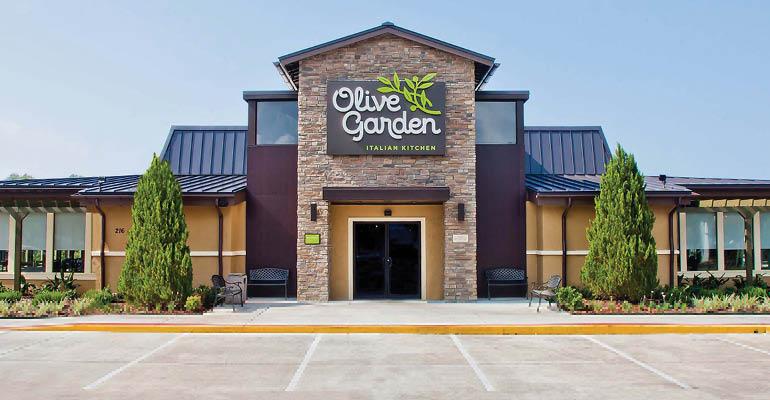(Bloomberg Gadfly)—Olive Garden can teach other restaurateurs a lesson.
No, not how to salt pasta water or bake breadsticks. The purveyor of unlimited salad and pasta might not be on the cutting edge of culinary excellence, but it seems to be ahead of its competitors in realizing that restaurants need to curb their appetite for expansion. Otherwise they'll end up making the same overbuilding mistake that retail chains made over the last decade, creating a surplus of stores that only now are they starting to rein in.
Darden Restaurants, Olive Graden's parent company, said this week that it would buy Cheddar's Scratch Kitchen for $780 million, sending shares up 9 percent. Investors were mostly cheering the earnings and sales growth bump that comes with acquiring a new chain, as well as a pretty hearty third-quarter earnings report.
But more telling was the admission by CEO Gene Lee that one of the big reasons Darden wanted to buy another chain, rather than rely on building more stores under its current roster of restaurant brands, is that he thinks the industry is ripe for consolidation.
"There's been an oversupply for 10 years in our industry," he said, explaining that when the company opens a restaurant today it's not creating new sales in the marketplace but stealing share from another restaurant.
He said that Olive Garden was "getting closer and closer" to full penetration and that it was becoming more difficult to find new locations where it could generate enough of a return to justify the cost of building a new restaurant without cannibalizing sales elsewhere.
In other words, America doesn't need any more Olive Gardens.
Restaurant chains typically shy away from discussing publicly the outsize growth in the restaurant industry in a negative light, preferring to talk about how restaurants are attracting millennials because dining out is viewed as an experience rather than an expense. They also like to point out that sales at restaurants overtook sales at grocery stores in the U.S. for the first time in 2015.
The problem is, restaurant sales growth, particularly at big chains, started to slow as soon as the industry hit that milestone. (It also happened to coincide with the introduction of the first exchange-traded fund that tracked restaurants, BITE. It has since announced plans to close). Labor costs ballooned. And just like what happened at retailers, customer traffic started to fall off. One analyst deemed it a "restaurant recession."
Meanwhile, competition has been rising from lower-priced grocery stores, home delivery and meal kits. That last point is particularly salient, as data from Slice Intelligence shows that after consumers sign up for at-home meal delivery from a service like Blue Apron, restaurant spending falls off more than spending at grocery stores.
Many restaurant chains are ignoring these trends and continuing to build. Many are even expanding into malls and other retail spaces left empty by stores that have closed. The amount of space typically dedicated to food within existing properties has grown from 5 percent a decade ago to 10 to 15 percent in some European markets, and 8 to 9 percent in the U.S., according to real estate firm JLL.
Chipotle is one of the worst offenders, pursuing aggressive growth strategies at its own peril. It plans to keep expanding its footprint by hundreds of stores a year despite falling sales and deeply declining returns on invested capital. Of course, Chipotle has its own problems to deal with as it tries to rebound from a food-safety crisis, but other companies like Dunkin' Brands Group Inc. and Starbucks Corp. are among those with lofty store opening plans in the U.S. and abroad.
It's that kind of refusal to see the writing on the wall that hurt retailers, which saw sales fall off as shoppers stopped going into stores for purchases that could more easily be bought online and delivered straight home.
Critics might question Darden's recent acquisition as an attempt to buy growth and overspend on M&A that might not turn out as good as its recipe promises. But the company's realization that building more Olive Gardens has its limits is a smart one. Other chains with large store footprints and declining sales would be wise to follow suit.
This column does not necessarily reflect the opinion of Bloomberg LP and its owners.
To contact the author of this story: Shelly Banjo in New York at [email protected] To contact the editor responsible for this story: Daniel Niemi at [email protected]
COPYRIGHT
© 2017 Bloomberg L.P

